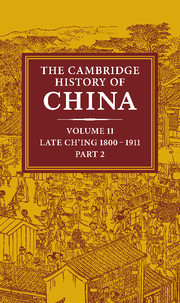Book contents
- Frontmatter
- 1 Economic trends in the late Ch'ing empire, 1870–1911
- 2 Late Ch'ing foreign relations, 1866–1905
- 3 Changing Chinese views of Western relations, 1840–95
- 4 The military challenge: the north-west and the coast
- 5 Intellectual change and the reform movement, 1890–8
- 6 Japan and the chinese revolution of 1911
- 7 Political and institutional reform 1901–11
- 8 Government, merchants and industry to 1911
- 9 The republican revolutionary movement
- 10 Currents of social change
- Bibliographical essays
- Bibliography
- Index
- Map 1. Ch’ing empire – physical features
- References
5 - Intellectual change and the reform movement, 1890–8
Published online by Cambridge University Press: 28 March 2008
- Frontmatter
- 1 Economic trends in the late Ch'ing empire, 1870–1911
- 2 Late Ch'ing foreign relations, 1866–1905
- 3 Changing Chinese views of Western relations, 1840–95
- 4 The military challenge: the north-west and the coast
- 5 Intellectual change and the reform movement, 1890–8
- 6 Japan and the chinese revolution of 1911
- 7 Political and institutional reform 1901–11
- 8 Government, merchants and industry to 1911
- 9 The republican revolutionary movement
- 10 Currents of social change
- Bibliographical essays
- Bibliography
- Index
- Map 1. Ch’ing empire – physical features
- References
Summary
BACKGROUND - ASPECT OF THE WESTERN IMPACT
In China in the 1890s there began an intellectual ferment which not only generated a movement for political reform but also ushered in a new era of socio-cultural change. This ferment, to be sure, owed a great deal to indigenous developments within the Chinese cultural tradition in the late nineteenth century. In Confucianism the reactions against the vogue of Han learning continued to reverberate among Chinese scholars, and there was a revival of interest in Buddhism and classical non-Confucian philosophies. All these developments, however, were more or less outgrowths of the intellectual changes that had already begun in the early nineteenth century. What transformed these indigenous developments into an intellectual ferment was the change provoked by Western expansion.
This had two primary aspects. The obvious one was the coercion and exploitation that Western nations imposed on China – imperialism. The other, a transformative one, was the variety of changes brought to China through contact with the West. The 1890s saw new developments in both areas.
By 1890 China had had to confront half a century of imperialist expansion, but now imperialist aggression entered a new and climactic stage. In the wake of China's humiliating defeat by Japan, the Western powers, spearheaded by France's claim to a ‘sphere of influence’ in South and South-West China in the early summer of 1895, began a frenzied ‘scramble for concessions’. At the height of this scramble, with Germany at Kiaochow, and Russia at Port Arthur, China was threatened with imminent dismemberment. An unprecedented atmosphere of crisis was created, and a pervasive fear of ‘being cut up like a melon’.
- Type
- Chapter
- Information
- The Cambridge History of China , pp. 274 - 338Publisher: Cambridge University PressPrint publication year: 1980
References
- 17
- Cited by

